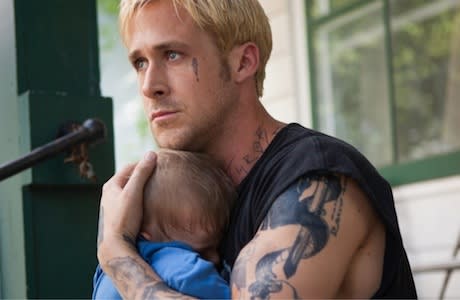Though detached, stoic and decidedly more affected than the white trash loudmouth he played in Blue Valentine, Ryan Gosling's character in director Derek Cianfrance's follow-up, The Place Beyond the Pines, similarly struggles with adult responsibility. Luke (Gosling), a motorcycle stunt driver and generalized loser, woos and abandons diner waitress Romina (Eva Mendes), unknowingly knocking her up in the process. A year later, he learns of his infant son and tries to make amends, looking for legitimate ways to earn money to help Romina raise him, despite her assertions that he need not get involved. Existing within the lexicon of a Cianfrance movie, where loose improvisation and faux-naturalism trump deliberate composition and muscular direction, their discussions have a protracted, Sisyphean sensibility. He pleads and smirks blankly, while she reluctantly acquiesces, presumably biting her tongue to avoid laughing at the knife teardrop tattooed on his face. This blandly organic sensibility frames the broad fatalism and cyclic behaviour outlined over the next two-and-a-half hours, which starts the moment Luke agrees to rob banks with part-time employer Robin (Ben Mendelsohn). That Luke is unable to adapt to the demands of the straight world — something he's eschewed with an obviously reckless lifestyle (the metaphor of motorcycle stunt driving isn't exactly subtle) — spells out the rudimentary thematic trajectory, suggesting that life is essentially preordained and that change is impossible once our identity has been shaped. Fortunately, this rather milquetoast, reductionist storyline abruptly ends after an impressively orchestrated, visceral motorcycle chase leaves Luke in the hands of ambitious rookie cop Avery (Bradley Cooper). This man is similarly trying to avoid the traps of cyclic behaviour, making a better world for his newborn son by resisting the corrupt dynamic within the force. His crisis of identity and conscience — one that comes from making a tragic mistake while on the job and covering it up — takes over the second chapter of the movie, having far more tension and dramatic ambiguity than the preceding storyline by sheer virtue of added character complexity and moral haziness. It's obvious that these two stories have some greater connecting intentions, which unfold predictably once Pines reaches its third chapter, where Avery and Luke's offspring become friends at the local high school. The overall assertion that cycles of behavioural repetition and mistakes have a compounding, generational effect is more glib than profound though. Every detail going into bringing these lives together is far too convenient, in both a superficial and thematic way, to generate the desired emotional catharsis. However, since the structure — it's essentially three mini-films — is slightly unconventional and intriguing as an experiment, there's a slight sense of Pines being more than it actually is. Regardless, it features Bradley Cooper's most complex performance to date and demonstrates the upcoming talents of Dane DeHaan and Emory Cohen, as the conflicted teenage sons of these damaged, socially abject men. The Blu-Ray features only a cursory "making of" that touches upon the structure and how the film came to be, as well as a very dry commentary track with Cianfrance.
(eOne)The Place Beyond the Pines [Blu-Ray]
Derek Cianfrance

BY Robert BellPublished Oct 2, 2013